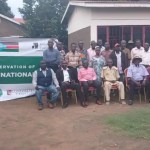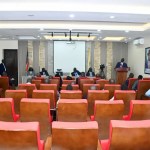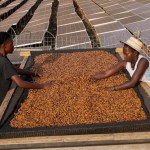(ELEGU, AMURU COUNTY) – Uganda’s northern trade gateway to South Sudan is set for a major transformation with the launch of the Elegu Climate Resilient Cross-Border Market Project. The initiative aims to expand regional trade while addressing climate-related challenges that have historically disrupted commerce.
Situated along the strategic Elegu–Nimule corridor, the market is one of Uganda’s busiest exit points for informal exports. Government data indicates that trade volumes increased from USD 50.38 million in 2018 to USD 111.3 million in 2022. In the same year, approximately 1.35 million metric tons of goods valued at USD 220 million (around 1.012 trillion Ugandan shillings) passed through Elegu, including agricultural produce, livestock, and manufactured products.
Allen Sophia Asiimwe, Deputy Country Director at TradeMark Africa, described the project as “a game-changer for inclusive growth.” She said the market would strengthen Uganda’s trade with South Sudan and provide opportunities for women, youth, and people with disabilities. She acknowledged the support of the European Union, the Government of Denmark, the Amuru community, and local authorities in realising the project.
Ms Sanne Willems, EU Head of Green Transition and Private Sector, noted that the new facility would eliminate flood-related market closures, offer safe spaces for up to 1,500 traders, and encourage women’s participation in cross-border trade. She added that under the Small-Scale Cross-Border Trade Enhancement Programme, Team Europe had mobilised USD 11.5 million (approximately 52.9 billion Ugandan shillings) for infrastructure, trader support, and peacebuilding initiatives in the Elegu–Nimule area. Willems stressed the importance of good governance, regular maintenance, and inclusive management to ensure sustainability.
State Minister for Trade, General Wilson Mbadi, described the launch of the Private Resilient and Gender-Responsive Cross-Border Market as a milestone for empowering women, youth, and small-scale traders while boosting trade with South Sudan.
“This project is not only about infrastructure but about creating opportunities, enabling value addition, and promoting sustainable economic growth,” he said. “The Government is committed to monetising the economy, raising household incomes, and driving export-led growth.”
Mbadi also encouraged traders to cooperate in removing trade barriers, describing the market as “a platform for peace, trade, and prosperity for Uganda and its neighbours.”
Officials report that informal exports to South Sudan have more than doubled in the past five years, making the country Uganda’s third-largest informal trade partner. The new market will feature improved storage, weather-proof infrastructure, and enhanced services to safeguard commerce from flooding and environmental risks.
The project is funded by the European Union and the Government of Denmark and implemented in partnership with TradeMark Africa.


















































